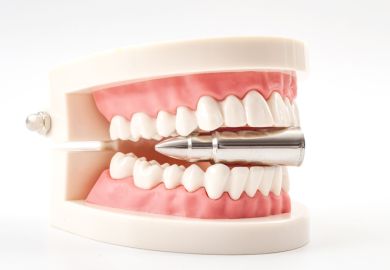The Westminster government is “quietly tightening the financial screws on students, graduates and universities” through its decisions not to adjust the loan and fee system in England to rising prices and earnings, a major thinktank warns.
In a briefing drawing attention to recent decisions on maintenance loans, graduate repayments and fee caps, a researcher at the Institute for Fiscal Studies says the government seems “determined to use high inflation as a cover for reducing the taxpayer cost of student loans”.
On maintenance loans, which are intended to help students with living costs while at university, the IFS points out that the government has again frozen the parental earnings thresholds at which different levels of support kicks in.
It had also raised the loan amounts available by only 2.3 per cent, “far short of both the current level of inflation and the level of inflation that can reasonably be expected over the next year”.
Taken together, these would hit lower-earning students in particular, at a time when “many are on very tight budgets”, the briefing, by IFS senior research economist Ben Waltmann, says.
“These cuts seem unlikely to be deliberate government policy, but that does not make them less damaging. They are likely to cause genuine hardship for students from poorer families,” it adds.
There is further criticism around the decision to freeze the earnings threshold at which graduates begin to repay their student loans at £27,295, “instead of being raised by 4.6 per cent to £28,550 in line with previous policy” to link it to rises in average earnings.
The briefing says that the freeze “might be read” as an admission that the government’s decision in 2018, under former prime minister Theresa May, to raise the threshold to £25,000 “as a giveaway to graduates” was a “mistake” given how it increased the costs of the loan system to the taxpayer.
But it adds “whatever else one may think of the threshold freeze, it does seem somewhat at odds with the government’s insistence that students are ‘consumers’ who should demand that universities deliver on their promises”.
This was because students who took out loans in the past “might have relied” on a government commitment to link the repayment threshold to average earnings.
“Importantly, no private lender would be allowed to change loan conditions retrospectively like this,” it says, although adding that state-backed loans still offered “a much better deal for most graduates than any private lender would be willing to offer”.
The briefing adds that it may take more threshold freezes to fundamentally change the balance of the loan system between taxpayers and graduates, but “just as keeping maximum tuition fees frozen has become a convenient way of cutting government expenditure on higher education, extending the threshold freeze for another year may become a politically expedient way to raise more money from graduates”.
Meanwhile, on undergraduate fees, which will be held at £9,250 in 2022-23 for the fifth year in a row, the briefing says the government’s stated goal of reducing student debt and making higher education “more affordable” is “at best one-third true”.
“Only a quarter of student loan borrowers can expect to pay back their loans; real cuts in fees only help those high-earning borrowers and the small share of students (or their parents) who are eligible for loans but do not take them up,” it says.
“In fact, the main beneficiary of real cuts in fees is the taxpayer, who will benefit to the tune of £1 billion per cohort from the freeze in maximum fees between 2020–21 and 2022–23 alone.”
Register to continue
Why register?
- Registration is free and only takes a moment
- Once registered, you can read 3 articles a month
- Sign up for our newsletter
Subscribe
Or subscribe for unlimited access to:
- Unlimited access to news, views, insights & reviews
- Digital editions
- Digital access to THE’s university and college rankings analysis
Already registered or a current subscriber?








